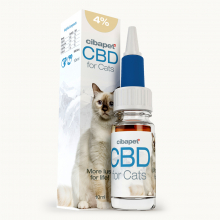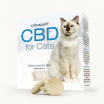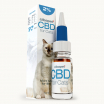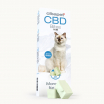What is the side effect of CBD in cats?
Published:
Cannabidiol (CBD) has become an increasingly popular supplement for humans in recent years. Now, pet owners are exploring its uses for cats and dogs. But is CBD safe for feline friends? Here's a look at CBD side effects in cats.
Contents:
- How Does CBD Work in Cats?
- Is CBD Safe for Cats?
- What Are the Potential Side Effects of CBD for Cats?
- Is CBD Toxic for Cats?
- Are There Contraindications for Feline CBD Use?
- What About THC Toxicity in Cats?
- What Are the Best Practices for Giving CBD to Cats?
- What Conditions Might CBD Help With in Cats?
- Are There Any CBD Health Benefits for Cats?
- What Types of CBD Products Are Available for Cats?
- How is CBD Administered/Dosed in Cats?
- What Should I Know When Buying CBD Products for Cats?
- What's the Bottom Line on CBD for Cats?
- CBD for Cats: A Detailed FAQ on Side Effects and Safety
- What Exactly is CBD?
- Is CBD Legal to Give My Cat?
- How Could CBD Potentially Help My Cat?
- What Are the Potential Side Effects of CBD in Cats?
- Is CBD Toxic for Cats?
- What Medical Conditions Should Avoid CBD?
- What’s the Correct CBD Dosage for Cats?
- How Long Does it Take for CBD to Work in Cats?
- How Long is CBD Detectable in a Cat's System?
- What Should I Do if My Cat Has a Negative Reaction to CBD?
- Are There Ways to Make CBD Easier for a Cat to Take?
- What Should I Look for When Buying CBD for Cats?
- Is CBD a Replacement for My Cat's Current Medications?
- Are There Alternative Options Besides CBD for My Cat?
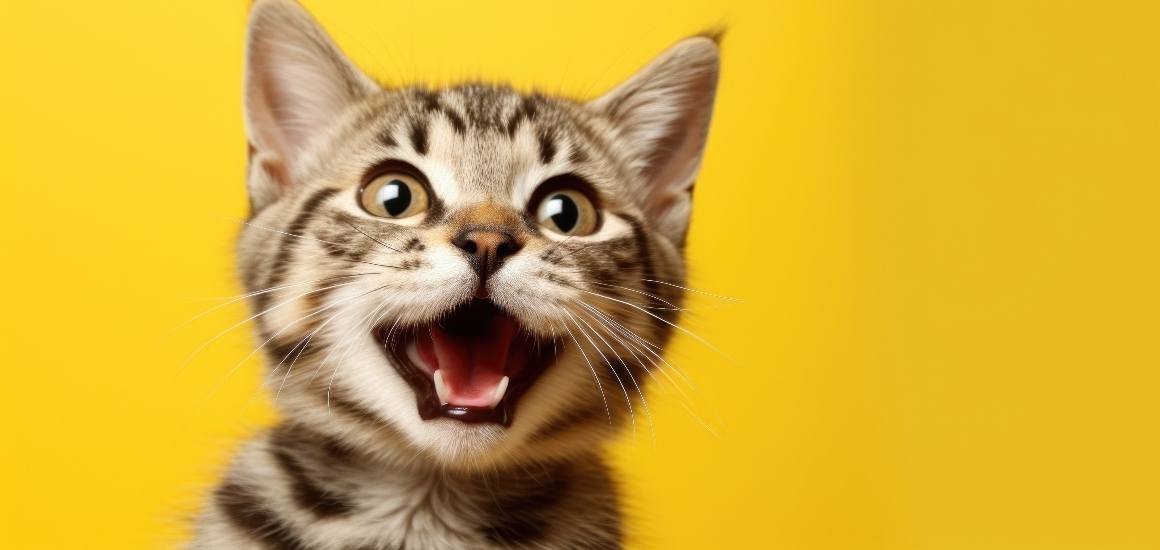
How Does CBD Work in Cats?
Like humans, cats have an endocannabinoid system. This system regulates various bodily functions like mood, appetite, pain perception, and more. It uses natural cannabis-like chemicals called endocannabinoids.
CBD is one of over 100 active compounds found in the cannabis plant. Unlike the high-inducing THC, CBD is non-intoxicating. It may influence the endocannabinoid system to help regulate imbalances.
So in theory, CBD can provide similar benefits in cats as it does in people - supporting calm moods, pain relief, appetite stimulation, etc. But more research is still needed on the mechanisms and safety.
Is CBD Safe for Cats?
There are no CBD products specifically approved by the FDA for use in animals. And limited research exists on CBD safety and efficacy in cats. But preliminary studies are promising.
One study gave CBD oil to cats with osteoarthritis. After a month, 89% of cats had decreased pain scores. Side effects were mild.
Another small study explored CBD for anxiety in cats. After doses of CBD, cats had less stress during car rides. Again, no major safety issues arose.
So current evidence suggests CBD is generally well-tolerated in cats. But there are still some potential side effects to consider.
What Are the Potential Side Effects of CBD for Cats?
Most common CBD side effects in cats are mild. In studies, the following were observed:
- Dry mouth: Decreased saliva production may lead to drooling. Ensure fresh water is always available.
- Lowered blood pressure: CBD may cause brief drops in blood pressure. Use caution when combining with blood pressure medications.
- Drowsiness: CBD may cause sedation. Lower doses can help avoid drowsiness.
- Changes in liver enzymes: CBD may temporarily elevate liver enzymes. Opt for smaller doses and monitor your cat's liver health if concerned.
- Upset stomach: Diarrhea or decreased appetite could occur. Monitor for vomiting, diarrhea, or other signs your cat feels unwell.
These effects are usually transient and resolve within hours. But some cats may be more sensitive than others.
Is CBD Toxic for Cats?
In rare cases, CBD could potentially be toxic for cats.
One issue is dosage errors. Unlike regulated pharmaceuticals, CBD product quality and labeling accuracy varies. A Cornell study found only 32% of CBD products were accurately labeled.
Accidental CBD overdoses in pets have led to:
- Lethargy/lack of coordination
- Low heart rate
- Dry mouth/excessive thirst
- Muscle tremors
- Agitation
Also, the safety of long-term, high-dose CBD in cats remains unknown. Using the lowest effective dose under veterinary guidance is advised.
Are There Contraindications for Feline CBD Use?
CBD may not be suitable for every cat. Those with the following conditions should avoid or use it cautiously under vet supervision:
- Liver disease: CBD is metabolized through the liver, so damage may increase side effects. Use low doses with extra monitoring.
- Kidney disease: Kidney disease may heighten CBD toxicity risk. Effects on kidneys require more study.
- Blood-clotting disorders: CBD may increase bleeding risk. Avoid use before surgery and with blood thinners like heparin.
- Lowered blood pressure: High CBD doses could worsen hypotension. Use small doses and monitor for dizziness.
- Pregnancy/nursing: Lack of safety research means pregnant or nursing cats should not use CBD.
Talk to your vet before using CBD if your cat has any underlying conditions. Never combine CBD with other meds without veterinary guidance.
What About THC Toxicity in Cats?
While CBD is non-intoxicating, full-spectrum extracts have trace amounts of THC. THC is toxic for cats at certain doses.
According to PetPoisonHelpline, ingestion of as little as 1 mg/pound of THC can be fatal in cats. That's much less than the lethal dose for dogs.
Signs of THC toxicity in cats include:
- Vomiting
- Lack of coordination
- Dilated pupils
- Hypothermia
- Seizures
- Coma
Seek emergency veterinary treatment if THC exposure is suspected. For the safest CBD options, choose THC-free products made just for pets.
What Are the Best Practices for Giving CBD to Cats?
Follow these tips for safe CBD use in felines:
- See the vet first. Get medical guidance on appropriate products/dosages for your cat.
- Go slow. Start with small doses like 1 mg and gradually increase every 1-2 weeks if needed.
- Use pet formulas. Avoid human CBD, as ingredients may not suit cats. Seek pet-specific oils, treats, or capsules.
- Pick THC-free. Choose CBD isolate or broad-spectrum formulas to avoid THC risks.
- Check labeling. Ensure milligram doses and lab analysis certificates are present.
- Monitor reactions. Watch for side effects like digestive upset or drowsiness.
- Keep records. Log your cat's reactions and dose changes. Share records with your vet.
While considered fairly safe, there are still gaps in CBD research for cats. Working closely with your vet, approach use cautiously and discontinue if any worrisome reactions occur.
What Conditions Might CBD Help With in Cats?
While more studies are needed, CBD shows initial promise for certain feline health issues:
Anxiety
Like their human counterparts, many cats suffer from anxiety. Situations like car rides, visits to the vet, or changes in household routine can be stressful. Mild sedation from CBD may help calm anxious cats.
In one study of anxious kitties given CBD before a car ride, CBD reduced excessive meowing and other signs of stress. More research is underway on CBD for feline anxiety relief.
Arthritis/Joint Pain
CBD has known anti-inflammatory properties. For senior cats or those with joint injuries, it may ease stiffness and pain.
A Cornell study found 89% of cats with osteoarthritis had decreased pain and increased mobility after taking CBD twice daily for a month. More research could cement CBD's role in managing feline arthritis.
Appetite Issues
For cats with decreased hunger - whether from chemotherapy, chronic illness, or other causes - CBD may get them eating again.
The endocannabinoid system regulates appetite. Small CBD doses may act on this system to spur interest in food. More clinical trials around CBD for appetite stimulation in pets are underway.
Seizures
In humans, CBD shows promise in reducing seizure frequency for epilepsy patients. Similar benefits may exist for cats.
While formal studies are still needed, some owners report fewer seizures in cats taking CBD. Researchers believe CBD may reduce seizure activity through its actions on the endocannabinoid system.
Cancer Symptom Relief
Also like humans, cats can develop unfortunate cancers like lymphoma or mammary tumors. Research shows CBD may have anti-tumor properties.
While not a cure, animal studies suggest CBD may slow cancer growth and enhance traditional treatments. By reducing vomiting and pain, CBD also improves quality of life for cats undergoing chemotherapy.
Chronic Inflammation
For chronic inflammatory conditions in cats like allergies, bowel disease, or bladder inflammation, CBD may help reduce swelling and ease discomfort.
Its anti-inflammatory properties could mitigate inflammatory triggers and provide comfort during flares. More research is still needed regarding CBD for these chronic inflammatory feline ailments.
While an emerging therapy, CBD may eventually play a role managing several common cat health issues. As always, discuss treating any medical conditions with your veterinarian first.
Are There Any CBD Health Benefits for Cats?
Although CBD research in cats is in early stages, some potential wellness advantages appear promising:
- Reduced shedding: By moderating inflammatory reactions, CBD may lessen excessive shedding triggered by allergies or stress.
- Calmer disposition: CBD often has a mild soothing effect that can take the edge off a high-strung personality.
- Healthier skin/coat: CBD's antioxidant properties may improve skin and coat health when supplemented long-term.
- Better sleep: Nighttime CBD dosing could help anxious cats who have trouble settling at bedtime.
- Decreased inflammation: CBD may reduce inflammatory responses to exercise and everyday stress in active cats.
- Improved mobility: In older cats, CBD appears to ease joint discomfort and maintain mobility as they age.
For optimal feline health, CBD could lend additional support alongside a high-quality diet, exercise, enrichment, and routine vet care. But more studies confirming benefits are needed.
What Types of CBD Products Are Available for Cats?
There are a variety of CBD formulas made specifically with pets in mind:
CBD Pet Oils/Tinctures
Like human tinctures, these CBD-infused oil solutions make it easy to dial in precise doses. Tinctures can be mixed into food or placed directly in the mouth. Flavorings like fish or chicken can make them more palatable.
CBD Pet Capsules/Chews
CBD capsules and chews mask the distinct flavor of CBD oil in crunchy pill pockets or tasty treats. Dosing is simple and convenient for pet owners. Capsules provide the most consistent absorption.
CBD Pet Topicals
CBD salves, gels, sprays, and creams are made to be rubbed on irritated skin, sore joints, or painful areas. Topicals provide localized benefits without entering the bloodstream.
CBD Pet Treats
These crunchy training treats or soft chews provide CBD in a tasty, enticing package. Treats typically have lower CBD levels for mild supplementation rather than symptom relief.
Other CBD Pet Products
Some companies also offer infused balms, pastes, peanut butters, and other creative CBD formulations for pets. Choose based on what best suits your cat's needs and preferences.
Always source CBD pet products from reputable companies that share third-party lab testing. This verifies purity, potency, safety, and the absence of THC.
How is CBD Administered/Dosed in Cats?
Key dosing factors for cats include the product type, concentration, your cat's weight, and the condition being treated. Here are some general dosage guidelines:
- CBD oils: Give 1-5 mg CBD per 10 pounds body weight twice daily. Start low at 1 mg and increase every 1-2 weeks if needed.
- CBD capsules: Follow package dosing by weight, typically 5-15 mg CBD capsules twice daily.
- CBD treats: Give 1-5 mg CBD per treat, 1-2 times daily. Start with 1 treat and increase every 1-2 weeks if ineffective.
- Topicals: Apply to the affected area 1-2 times daily. Dose is not based on weight.
Always follow package dosing, especially for concentrates. Monitor for side effects and adjust dose down if needed. Seek veterinary guidance to find the optimal dosage for your cat.
What Should I Know When Buying CBD Products for Cats?
There are a few key considerations when choosing a CBD product for your feline:
- Organic formulas avoid pesticides and toxins that could be dangerous if consumed.
- CO2 extracted oils are highest quality for purity and safety. Avoid solvent-based extracts.
- 3rd party lab results validate CBD levels and the absence of THC, chemicals, and contaminants.
- Pet-specific products are formulated with proper carriers, flavors, and dosing for cat supplement needs.
- THC-free options like broad-spectrum or isolate formulas prevent THC risks.
- Reputable brand reputation based on transparent company practices and stellar reviews.
- Fair pricing balances affordability with quality ingredients and effective CBD concentrations.
Discuss specific product choices with your veterinarian and verify they approve use for your cat. Only purchase from companies that offer thorough lab analysis for verification.
What's the Bottom Line on CBD for Cats?
Early research suggests CBD can provide similar benefits for cats as people - easing pain and anxiety, reducing seizures, stimulating appetite, and more. Mild side effects like drowsiness or upset stomach are possible.
While considered low-risk, there are still gaps in knowledge on CBD's long-term safety profile and efficacy in cats. Many vets recommend avoiding use except for severe conditions unresponsive to other treatments.
Work closely with your vet on dosing, monitoring, and choosing appropriate CBD products for your cat's needs. Keep doses modest and watch closely for side effects.
With judicious use and veterinary oversight, CBD may offer a helpful integrative option for optimizing cat health and wellness. But more clinical trials confirming its safety and effectiveness for our feline companions is still warranted.
CBD for Cats: A Detailed FAQ on Side Effects and Safety
CBD (cannabidiol) has become a popular wellness supplement for humans. Now, interest is growing around its use in pets. But is CBD safe for cats? This FAQ provides in-depth answers on potential CBD side effects in felines.
What Exactly is CBD?
CBD is one of over 100 active compounds found in the cannabis plant called cannabinoids. Unlike THC, CBD is non-intoxicating and does not cause a high. The compound interacts with the endocannabinoid system, which regulates various body functions and responses. By modulating this system, CBD may provide benefits like pain relief, reduced anxiety, appetite stimulation, and more.
Is CBD Legal to Give My Cat?
In the U.S., CBD derived from hemp containing less than 0.3% THC is legal on a federal level. However, several states still restrict CBD use in pets. It's advisable to check your local laws before giving CBD to cats.
How Could CBD Potentially Help My Cat?
Research is still limited, but initial studies suggest CBD may help cats in the following ways:
- Easing pain and inflammation from arthritis, injuries, and dental issues
- Reducing anxiety related to travel, vet visits, or loud noises
- Controlling seizure frequency in felines with epilepsy
- Stimulating appetite in sick, elderly, or stressed cats
- Providing symptom relief for cats with cancer
- Improving mobility and activity levels in senior cats
More clinical trials are underway to further confirm efficacy and approved uses.
What Are the Potential Side Effects of CBD in Cats?
In studies, the following mild side effects have been observed in some cats taking CBD:
- Digestive upset like decreased appetite or diarrhea
- Drowsiness or lethargy
- Drooling or dry mouth
- Brief drop in blood pressure upon standing
- Slight elevation in liver enzymes
These effects are usually temporary and typically resolve within 6-24 hours. But CBD can potentially cause more serious side effects in rare cases.
Is CBD Toxic for Cats?
CBD is generally well-tolerated by cats, but there are some risks in certain situations:
- Overdoses: Dosing errors can lead to CBD toxicity. Always precisely follow dosing guidelines and monitor your cat closely.
- Drug interactions: CBD may interact with medications like blood thinners and benzos. Do not give CBD with any other meds without veterinary approval.
- THC toxicity: Full spectrum CBD may contain traces of THC, which can be toxic to cats even in small amounts. Use THC-free CBD products.
- Long-term use: The safety of chronic, high-dose CBD administration in cats is unknown. Use the lowest effective dose under vet supervision.
What Medical Conditions Should Avoid CBD?
Cats with the following conditions should not use CBD unless approved by a vet:
- Liver disease
- Kidney disease
- Blood clotting disorders
- Low blood pressure
- Pregnancy/nursing
CBD is metabolized through the liver and kidneys, so damage could increase side effects. It may also increase bleeding risks. Always inform your vet about any medical conditions before using CBD.
What’s the Correct CBD Dosage for Cats?
There are no official dosing guidelines for CBD in cats yet. Factors like product type, concentration, your cat's weight, and the condition being treated impact ideal dosing. Follow package dosing or these general guidelines:
- Oils/tinctures: 0.5-2 mg CBD per kg weight twice daily
- Capsules: 1-5 mg per 10 lbs weight twice daily
- Treats: 1-5 mg per treat 1-2 times daily
Start on the low end of the dosage range and gradually increase every 1-2 weeks if needed until desired effects are achieved. Divide doses evenly throughout the day.
How Long Does it Take for CBD to Work in Cats?
Onset of effects vary based on the administration method:
- Oils/tinctures: 45-90 minutes
- Capsules: 60-120 minutes
- Treats: 45-60 minutes
- Topicals: 15-30 minutes
Each cat responds differently as well. Response times typically shorten as CBD builds up in the body over consistent dosing for several weeks. Effects last 4-8 hours on average.
How Long is CBD Detectable in a Cat's System?
A one-time dose of CBD is usually detectable for 1-2 days after administration. With chronic dosing, CBD can be detected for 1-2 weeks after complete cessation. Factors like dose amount, frequency, and sensitivity of detection methods can influence timelines.
What Should I Do if My Cat Has a Negative Reaction to CBD?
Stop administration immediately. Monitor vital signs and watch for:
- Lethargy, lack of coordination, or collapse
- Rapid, slowed, or irregular heartbeat
- Muscle tremors or seizures
- Drooling, vomiting, or diarrhea
- Agitation or restlessness
If symptoms are severe, seek emergency veterinary treatment. For mild reactions, call your regular vet for further guidance. Report all side effects to the CBD manufacturer as well for documentation.
Are There Ways to Make CBD Easier for a Cat to Take?
If your cat dislikes the taste of CBD oil, these tips can help with administration:
- Mix oil into wet food as a “sauce” to mask taste
- Place oil on cat’s paw for licking rather than direct dosing
- Follow with a strong-flavored cat treat as a “chaser”
- Use pill pocket treats or flavored capsules instead of raw oil
- Reward with a favorite snack after dosing
- Gradually get cat accustomed to oil taste with time
Proper technique like placing far back on the tongue and closing the mouth after also minimizes oil taste exposure.
What Should I Look for When Buying CBD for Cats?
To ensure quality and safety, only purchase CBD products that have:
- Clear evidence of 3rd party lab testing for potency and purity
- Hemp sourced from licensed American growers
- No traces of THC, pesticides, or contaminants
- Pet-specific formulas using cat-safe carriers and flavorings
- Legal levels of CBD per serving for pets
- Proper, child-resistant packaging and warning labels
- Glowing customer reviews and brand reputation
Reputable companies readily provide lab analysis and ingredient details. Discuss any product with your vet before use.
Is CBD a Replacement for My Cat's Current Medications?
No, CBD should never replace prescribed veterinary medications without explicit guidance from your vet. It's considered an integrative supplement that may provide additional symptom relief and wellness support when used under medical supervision.
Never change your cat's medication dosages or stop giving prescribed drugs without veterinary approval. CBD could interact with some medications and alter their effectiveness and side effects.
Are There Alternative Options Besides CBD for My Cat?
There are several other holistic supplements that may help cats with certain conditions:
- Glucosamine/chondroitin for joint health
- Probiotics for digestion and immunity
- Omega-3 fatty acids for skin/coat health
- Milk thistle for liver support
- Melatonin for calming anxiety
- Valerian root for relieving pain or insomnia
- Digestive enzymes for IBD issues
Discuss alternative supplements with your vet to determine if any are appropriate options for your feline companion.
As always, check with your veterinarian before giving your cat any new supplements like CBD. While a potentially beneficial integrative treatment, there are still unanswered questions surrounding its long-term use in cats. Proceed with caution under medical supervision.









